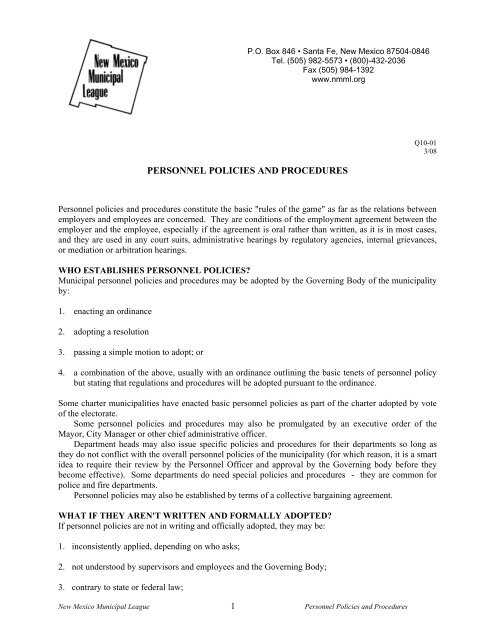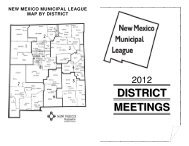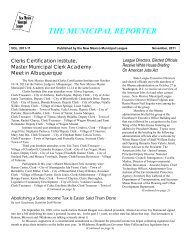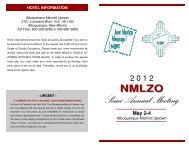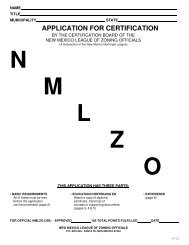Personnel Policies and Procedures - New Mexico Municipal League
Personnel Policies and Procedures - New Mexico Municipal League
Personnel Policies and Procedures - New Mexico Municipal League
- No tags were found...
You also want an ePaper? Increase the reach of your titles
YUMPU automatically turns print PDFs into web optimized ePapers that Google loves.
P.O. Box 846 • Santa Fe, <strong>New</strong> <strong>Mexico</strong> 87504-0846Tel. (505) 982-5573 • (800)-432-2036Fax (505) 984-1392www.nmml.orgPERSONNEL POLICIES AND PROCEDURESQ10-013/08<strong>Personnel</strong> policies <strong>and</strong> procedures constitute the basic "rules of the game" as far as the relations betweenemployers <strong>and</strong> employees are concerned. They are conditions of the employment agreement between theemployer <strong>and</strong> the employee, especially if the agreement is oral rather than written, as it is in most cases,<strong>and</strong> they are used in any court suits, administrative hearings by regulatory agencies, internal grievances,or mediation or arbitration hearings.WHO ESTABLISHES PERSONNEL POLICIES?<strong>Municipal</strong> personnel policies <strong>and</strong> procedures may be adopted by the Governing Body of the municipalityby:1. enacting an ordinance2. adopting a resolution3. passing a simple motion to adopt; or4. a combination of the above, usually with an ordinance outlining the basic tenets of personnel policybut stating that regulations <strong>and</strong> procedures will be adopted pursuant to the ordinance.Some charter municipalities have enacted basic personnel policies as part of the charter adopted by voteof the electorate.Some personnel policies <strong>and</strong> procedures may also be promulgated by an executive order of theMayor, City Manager or other chief administrative officer.Department heads may also issue specific policies <strong>and</strong> procedures for their departments so long asthey do not conflict with the overall personnel policies of the municipality (for which reason, it is a smartidea to require their review by the <strong>Personnel</strong> Officer <strong>and</strong> approval by the Governing body before theybecome effective). Some departments do need special policies <strong>and</strong> procedures - they are common forpolice <strong>and</strong> fire departments.<strong>Personnel</strong> policies may also be established by terms of a collective bargaining agreement.WHAT IF THEY AREN'T WRITTEN AND FORMALLY ADOPTED?If personnel policies are not in writing <strong>and</strong> officially adopted, they may be:1. inconsistently applied, depending on who asks;2. not understood by supervisors <strong>and</strong> employees <strong>and</strong> the Governing Body;3. contrary to state or federal law;<strong>New</strong> <strong>Mexico</strong> <strong>Municipal</strong> <strong>League</strong> 1 <strong>Personnel</strong> <strong>Policies</strong> <strong>and</strong> <strong>Procedures</strong>
4. unenforceable;5. a potential liability for the municipality; <strong>and</strong>6. the cause of the immeasurable chaos, confusion, discontent, grievances, <strong>and</strong> complaints by employeessupervisors <strong>and</strong> the general public - your customers!WHAT MATTERS DO PERSONNEL POLICIES AND PROCEDURES COVER?Much depends on how large the municipality is <strong>and</strong> how many levels of supervision are involved in dayto day operations. The perfect, absolutely comprehensive personnel policy has yet to be written, but thefollowing will give you an idea of what might be included, depending on perceived need:Working Conditions GenerallyChart of municipal organization <strong>and</strong> lines of authority, hours of work, location of work, reportingfor work, conduct on the job, job discrimination (race, color, creed, ancestry, age, sex,h<strong>and</strong>icaps), sexual harassment, required dress or uniform, telephone use, telephone etiquette,h<strong>and</strong>ling the public, coffee breaks, health <strong>and</strong> safety, use <strong>and</strong> care of municipal vehicles <strong>and</strong>equipment, accident reporting, employee grievances, etc.PayStarting pay, frequency of pay days <strong>and</strong> pay period covered, reporting time worked, required <strong>and</strong>voluntary deductions, deductions for missed work, pay increases (how often, how much, for whatreasons, who approves, when effective), st<strong>and</strong>by pay, callback pay, overtime compensation, mileage<strong>and</strong> per diem reimbursement, pay advances, promotion, severance pay (if any), etc.Hiring, Retention <strong>and</strong> FiringWho decides "at will" employment (see Page 5), recruiting, selection, hiring, employment of relatives,job descriptions, performance appraisal, transfer between jobs, promotion, demotion,retirement, layoff, resignation, dismissal, appeal rights (if any), exit interviews, return of municipalproperty, final pay, etc.DisciplineWho decides unauthorized absences, prohibited actions by employees, causes of discipline,severity of discipline (oral warning, written reprim<strong>and</strong>, suspension without pay, demotion forcause, dismissal), notice of discipline, appeal of disciplinary action (if any), etc.Employee BenefitsPaid holidays, annual (vacation) leave, sick leave, unpaid leave, group health insurance, lifeinsurance, temporary disability, permanent disability, other insurance coverages, retirement plan,worker's compensation, jury leave, military training leave, etc.<strong>New</strong> <strong>Mexico</strong> <strong>Municipal</strong> <strong>League</strong> 2 <strong>Personnel</strong> <strong>Policies</strong> <strong>and</strong> <strong>Procedures</strong>
<strong>Personnel</strong> RecordsWho keeps contents, who may examine, who may add or delete items from file, how long kept, release to thirdparties.Even this list, long as it is, may not cover everything that could be included in personnel policies <strong>and</strong>procedures. Just how complex <strong>and</strong> detailed your policies <strong>and</strong> procedures may be depends on what yourmunicipality needs <strong>and</strong> can afford, in time <strong>and</strong> money.WHAT'S THE DIFFERENCE BETWEEN A POLICY AND A PROCEDURE?A policy is a statement of guiding principles to be followed; a procedure is a method by which thoseprinciples are implemented <strong>and</strong> carried out. Many <strong>New</strong> <strong>Mexico</strong> municipalities have written personnelpolicies; few have written procedures. Sometimes, especially in larger cities, some sections of thepersonnel policies become so detailed <strong>and</strong> specific that they virtually outline the procedures, especiallyfor disciplinary actions, grievances <strong>and</strong> appeals of adverse actions.<strong>Procedures</strong> commonly outline each step of a process <strong>and</strong>, where paperwork is involved, who initiates<strong>and</strong> who approves, <strong>and</strong> how they are routed. Most items affecting payroll include procedures to insure anaudit trail.WHAT'S THE DIFFERENCE BETWEEN A POLICY AND A REGULATION?In many cases, the policy contains all the regulations; in others, the regulations are supplemental to thepolicy <strong>and</strong> are adopted separately. For instance, the State <strong>Personnel</strong> Act, § 10-9-1 et seq., sets out manystatutory policies, but empowers the State <strong>Personnel</strong> Board to adopt regulations <strong>and</strong> procedures to implementthem. Some municipal ordinances contain policies only <strong>and</strong> empower the City Manager or chiefadministrative officer or apersonnel board to adopt regulations <strong>and</strong> procedures.HOW DO WE GET WRITTEN PERSONNEL POLICIES IF WE DON'T HAVE THEMOR AMEND THE ONES WE HAVE?1. The most practical way is to get a committee appointed to make recommendations to the GoverningBody. The committee may be the <strong>Personnel</strong> Board, if you have one, or a committee ofknowledgeable employees <strong>and</strong> department heads, <strong>and</strong>, if available, citizens with personnel knowledge<strong>and</strong> experience. You may include one or two Governing Body members, but since a lot of hard workis required, it's essential to get members willing to devote the necessary time to it.2. If you have no or very few personnel policies, start with writing down the unwritten policies alreadyin place <strong>and</strong> proceed from there. You may find that some policies were actually established byGoverning Body actions in minutes years ago. If you have some written policies, check them againstpast minutes as well, to make sure they reflect what the governing body actually voted on.3. Look at personnel policies from other municipalities, which you can get from the municipality or, insome cases, from the <strong>League</strong>. You don't have to "reinvent the wheel" if you can find good policies<strong>and</strong> good wording from other municipalities.4. Take into account the possible subjects listed on pages 1 <strong>and</strong> 2 that you may want to include <strong>and</strong> thestate <strong>and</strong> federal laws listed below. You may need several drafts before you get what you want.5. Do not just adopt some other organization's personnel policy without tailoring it to yourorganization. In some municipalities, league staff has run into such "canned" policies that are soirrelevant or sloppy that they even include references to federal, state or county officials or to officersof the private business from which they were "borrowed." Many times such "canned" policies areworse than having none at all.6. Make sure your proposed policies are reviewed by your municipal attorney (as well as an attorneywell versed in public employment law, if possible) <strong>and</strong> a competent personnel management profes-<strong>New</strong> <strong>Mexico</strong> <strong>Municipal</strong> <strong>League</strong> 3 <strong>Personnel</strong> <strong>Policies</strong> <strong>and</strong> <strong>Procedures</strong>
sional (preferably one with municipal experience) <strong>and</strong> consider their advice <strong>and</strong> suggestions beforeyou take your final draft to the Governing Body (or <strong>Personnel</strong> Board) for approval <strong>and</strong> adoption.You may need their advice <strong>and</strong> expertise in explaining some provisions to the Governing Body,especially if they are big changes from your current policies.You may need to pay for outside personnel consultants (including some municipal personnelofficers who "moonlight" in private practice) or you may persuade another municipality's personnelspecialist to do it as a favor.7. Do not lose heart or get discouraged at the time it takes or the obstacles you have to overcome. It isfar better to take the time to get something that fits your situation <strong>and</strong> that you can live with for a longperiod of time than to settle for a "quick fix" that may bring you problems farther along. If you can'tget a full set of policies adopted, try to get as much as you can - you can build on it later if it is sound.WHAT STATE AND FEDERAL LAWS AFFECT OUR PERSONNEL POLICIES?The list is fairly long <strong>and</strong> we are bound to miss some, but here's what comes readily to mind. Allreferences are to <strong>New</strong> <strong>Mexico</strong> Statutes Annotated, 1978 Compilation, unless otherwise noted.<strong>Municipal</strong> Merit SystemsAdoption by ordinance - §3-13-4Various federal laws providing funding whichrequire merit systems.Nondiscrimination, Recruiting, Hiring, Retention, Working ConditionsN.M. Human Rights Act - §23-1-1 through28-28-1-14.N.M. Nepotism provision - §10-1-10 & 11.N.M. law officers <strong>and</strong> dispatch qualifications- Chapter 29, NMSA 1978N.M. <strong>Municipal</strong> Housing - §3-45-5C(executive director may be fired only for cause.)Federal Civil Rights Act of 1964, as amended.Federal Age Discrimination in Employment Act.Federal Rehabilitation Act of 1973, as amended §504 - otherwise qualified individuals withdisabilitiesFederal Americans With Disabilities Act of 1990 (now commonly called ADA).Federal Family <strong>and</strong> Medical Leave Act of 1993.Various federal laws providing fundingwhich require merit systems.PayN.M. Wage <strong>and</strong> Hour Law - §50-4-1 through 50-4-19 - payday frequency, final pay, etc.N.M. Mileage <strong>and</strong> Per Diem Act - §10-8-1through 10-8-8, plus Department of Finance <strong>and</strong> Administration (DFA) Rules 95-1.<strong>New</strong> <strong>Mexico</strong> <strong>Municipal</strong> <strong>League</strong> 4 <strong>Personnel</strong> <strong>Policies</strong> <strong>and</strong> <strong>Procedures</strong>
Federal Fair Labor St<strong>and</strong>ards Act - Federalminimum wage, overtime pay.Title VII, Federal Civil Rights Act of 1964 -"Equal Pay for Equal Work."Federal Tax Reform Act of 1986 as amended, (Comprehensive Omnibus Budget Reconciliation Act -COBRA) - rules on personal use of city vehicles <strong>and</strong> provisions for group health continuation forterminated employees.BenefitsN.M. Worker's Compensation Act - §52-1-1through 52-1-70, plus Subsequent Injuries Act - §52-2-1 through 52-2-13 <strong>and</strong> Occupational DiseaseDisablement Act, - §52-3-1 through 52-3-60.N.M. provisions on public employee GroupInsurance, Cafeteria Plans - §10-7-4 through 10-7-5.1.N.M. Deferred Compensation provisions - §10-7-8, §10-7A-1 through 10-7A-11.N.M. Public Employees Retirement Act (PERA)- §10-11-1 through 10-11-140.Federal Social Security <strong>and</strong> Medicarerequirements (FICA)N.M. Retiree Health Care Act - §10-7C-1through 10-7C-16.N.M. Unemployment Compensation Act - §51-1-1 through 51-1-54.WHAT ABOUT THOSE TECHNICAL PROCESSES LIKE JOB CLASSIFICATION, PAYPLANS, AND PERFORMANCE APPRAISAL SYSTEMS, IF WE WANT AND NEED THEM?You can do a lot of the work the same way as in establishing the personnel policies - by committee withoutside consultation. That is enough material for another whole h<strong>and</strong>out, but ask municipalities that havegone through the process. It can be done if you are willing to devote the necessary time <strong>and</strong> effort.Remember, the personnel policies you adopt have a profound effect on employees’ lives <strong>and</strong> livelihood.Remember, too, that whatever is in your written personnel policy <strong>and</strong> the employee's jobdescription becomes a part of the employee's employment contract - so you must be extra careful tostate what the municipality expects of the employee <strong>and</strong> what the employee is entitled to from themunicipality.<strong>New</strong> <strong>Mexico</strong> <strong>Municipal</strong> <strong>League</strong> 5 <strong>Personnel</strong> <strong>Policies</strong> <strong>and</strong> <strong>Procedures</strong>
DO NOT PROMISE ANYTHING ABOVE AND BEYOND WHAT THE MUNICIPALITYINTENDS TO STAND BEHIND AND WILL DELIVER! FAILURE TO FOLLOW YOUROWN PERSONNEL POLICY IS ONE OF THE MOST POTENTIALLY EXPENSIVE LIABILITYEXPOSURES YOU CAN HAVE.The effort to get it right is worth the time.DO WE HAVE TO HAVE A MERIT SYSTEM? <strong>New</strong> <strong>Mexico</strong> law (§3-13-4 NMSA 1978) authorizesany municipality to adopt a merit system by ordinance, but does not require adoption of a merit system.§3-13-4 does not spell out what a true merit system includes <strong>and</strong> several municipalities have adopted whatthey thought were merit systems but which really do not contain all the basic requirements.A true merit system contains at least the following provisions, which you should look for in yourordinance:1. recruiting of applicants <strong>and</strong> hiring through open competition based solely on individual merit (qualificationsto perform the job, such as experience, training, knowledge <strong>and</strong> skill);2. that all decisions on hiring, assignment, retention, compensation, promotion, demotion <strong>and</strong>terminations shall be based solely on individual merit (qualifications <strong>and</strong> job performance);3. that an employee who has successfully completed a prescribed probationary period has attained jobtenure (a property right to the job) <strong>and</strong> may only be suspended without pay, demoted or dismissed for"just cause" such as unsatisfactory performance or misconduct of some kind;4. that an employee who has attained tenure through completion of probation may appeal his suspensionwithout pay, demotion or dismissal, <strong>and</strong> may receive a fair hearing on the merits of the case ("dueprocess" on depriving him of his "property right.")In addition, the U.S. Supreme Court has ruled in the case of Clevel<strong>and</strong> Board of Education v. Loudermill,(3/19/85), that an employee who has received tenure through successful completion of a probationaryperiod must be given an informal hearing before he is dismissed, even though he may have a formal rightof appeal after the dismissal. The court said that public employers do not have to give an employeetenure (a "property right") in his job, but if they do give that tenure, the hearing must take place beforethe tenure is taken away.DON'T MERIT SYSTEMS INCLUDE JOB CLASSIFICATION AND PAY SYSTEMS?Yes. In order to establish what qualifications applicants will be judged on, you have to know what thejobs actually do <strong>and</strong> what qualifications are required to do them. The easiest way to do that is to establisha job classifications system where jobs with substantially similar duties <strong>and</strong> qualifications are given thesame title <strong>and</strong> description (job classification).Then in order to make sure that jobs with substantially similar qualifications <strong>and</strong> responsibilities arecompensated approximately the same (job-based pay), a formal pay structure of pay ranges (sometimescalled grades) is established <strong>and</strong> each class of job is assigned to one pay range. The normal practice is foran employee to start at the lower end of the range <strong>and</strong> to progress solely on the basis of satisfactory orexceptional performance.Measuring performance as to unsatisfactory, satisfactory or exceptional requires a formal performanceappraisal system.If your municipality thinks it has established a merit system but has not provided a job classification<strong>and</strong> pay system, a formal performance appraisal system <strong>and</strong> a procedure for appeals of "adverse actions"(disciplinary procedures), most personnel professionals would say that it doesn't truly have a meritsystem.<strong>New</strong> <strong>Mexico</strong> <strong>Municipal</strong> <strong>League</strong> 6 <strong>Personnel</strong> <strong>Policies</strong> <strong>and</strong> <strong>Procedures</strong>
IS AN APPEAL DIFFERENT FROM A GRIEVANCE?In personnel management parlance, yes. A grievance may be about anything connected with the job orthe action of a fellow employee or supervisor, whereas an appeal should be restricted to an adverseemployment action (suspension without pay, demotion, dismissal). Any employee may have a grievance,but only an employee who has successfully completed the probationary period should be able to appeal anadverse employment action; an employee who serves "at will" (see below) should not be granted the rightto appeal an adverse employment action.Even with a merit system, some jobs <strong>and</strong> some employees are usually "at will" rather than covered bytenure (property right). "At will" employment generally covers the employee who runs the merit system(usually the city manager or the municipal clerk) <strong>and</strong> employees who have not completed theprobationary period as well as temporary or seasonal employees.WHAT DO YOU MEAN BY "AT WILL" EMPLOYMENT?The statutes imply that where a municipality does not have a city manager <strong>and</strong> has not established a meritsystem, all employees serve at the will of the mayor <strong>and</strong> governing body <strong>and</strong>:may be replaced by the mayor's naming a different person for any job at the "organizational meeting"of the governing body <strong>and</strong> the governing body's approving that appointment by vote of a majority ofall members [§3-11-5 NMSA 1978]; ormay be dismissed at any time by vote of the majority of all members of the governing body [§3-116D(1)]; ormay be dismissed at any time by the mayor with the approval of the majority of all members of thegoverning body [§3-11-6D(2)]; ormay be dismissed by the City Manager without the approval of the Mayor or Commission [§3-14-14.A(2)].That is "at will" employment, which means the employee may be dismissed or replaced with or without"cause" <strong>and</strong> that employee does not acquire a "property right" in continued employment, therebyrequiring "due process" in removing that property right under Article XIV of the Bill of Rights of the U.S.Constitution.Incidentally, if either your personnel ordinance, your personnel regulations, or your employeeh<strong>and</strong>book uses the word "permanent" to refer to a job other than temporary or seasonal, or to anemployee who has successfully completed the probationary period, get it amended to use someother term such as "regular" - courts are inclined to rule that "permanent" implies a propertyright to the job.<strong>New</strong> <strong>Mexico</strong> <strong>Municipal</strong> <strong>League</strong> 7 <strong>Personnel</strong> <strong>Policies</strong> <strong>and</strong> <strong>Procedures</strong>


